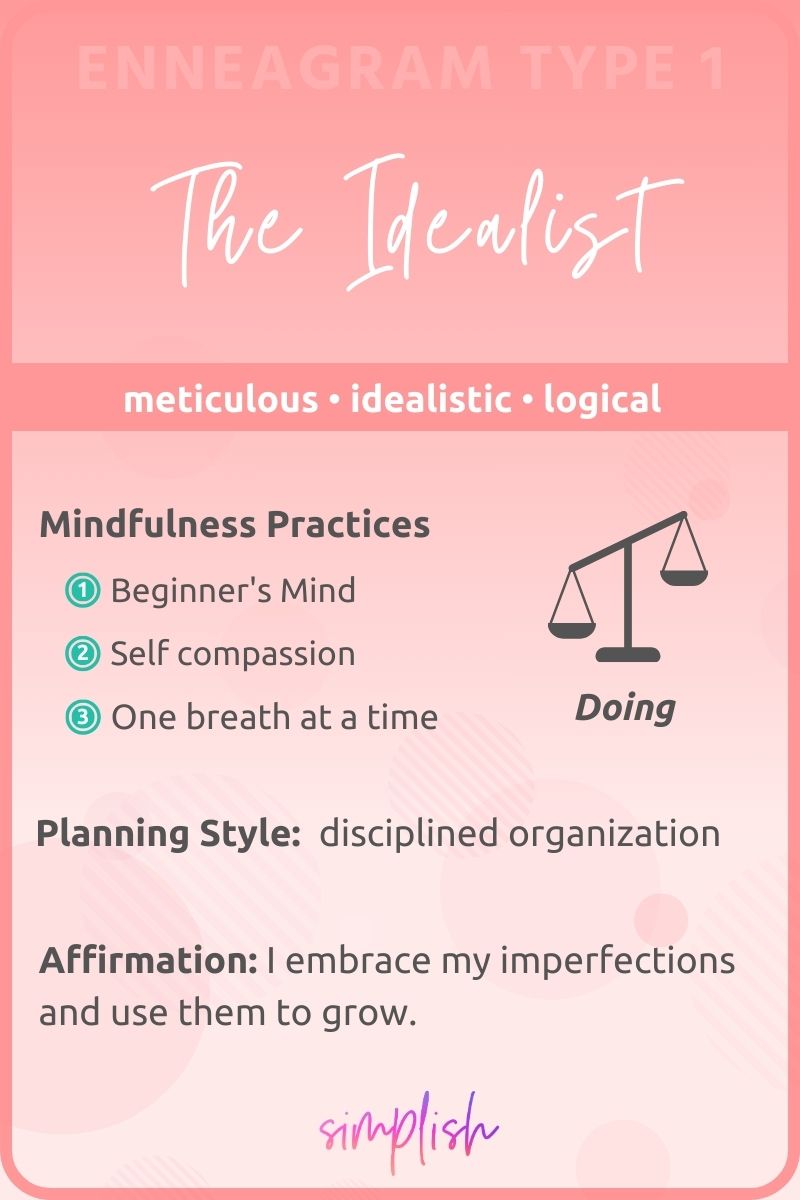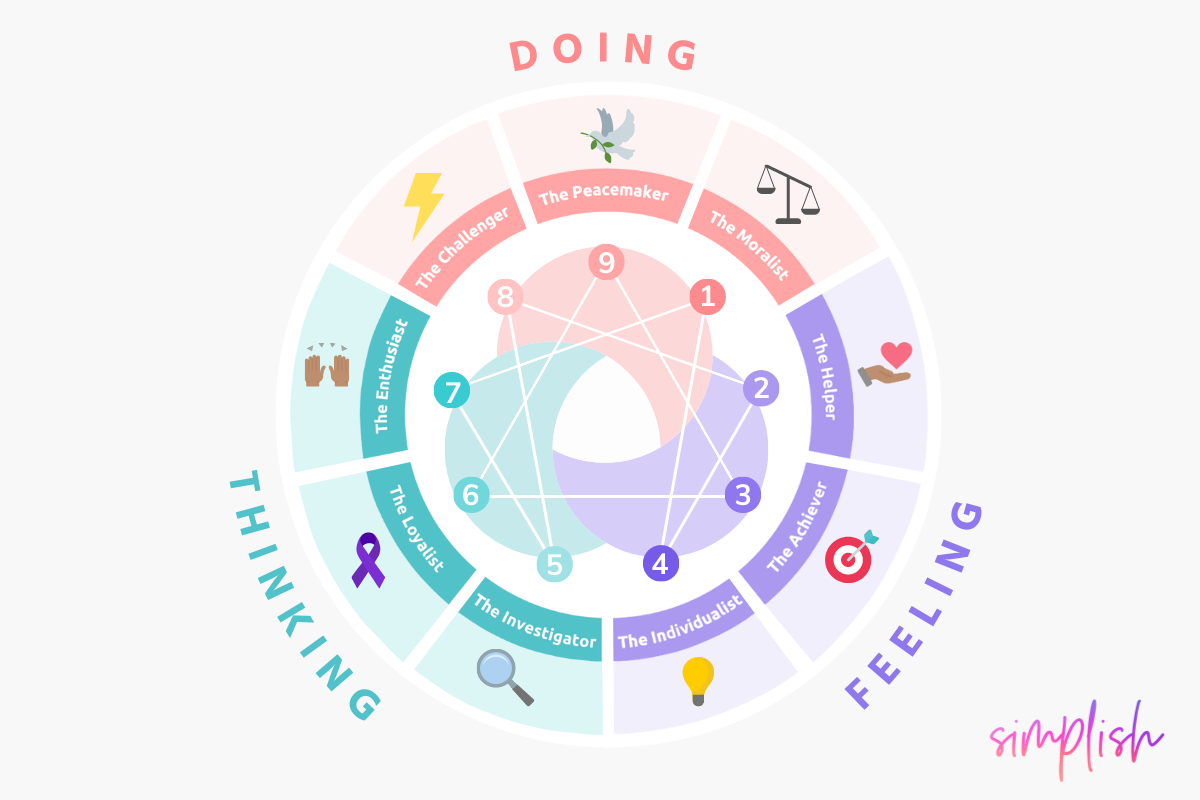Enneagram Type 1: The Idealist
Are you always striving to improve the world around you? You might be an Enneagram Type One, also known as The Idealist. The Type 1 is also commonly known as The Perfectionist, Moral Perfectionist, The Reformer, or the Moralist. By whatever name, this type is driven by doing right in the world.
With a strong sense of purpose, self-control, and a desire for perfection, Type Ones are driven to make a positive impact in their personal and professional lives. Moralists live according to lofty values, even at the cost of great personal sacrifice.
What Motivates The Idealist?
History is full of Type One people who have left comfortable lives to do something extraordinary in the name of a higher calling. Joan of Arc left her town in France to restore the Dauphin to the throne. Hillary Clinton has dedicated her life to advocating for social change and improving the lives of those around her. Here is a breakdown of the Type One personality in brief:
Motivation: Enneagram Type Ones are motivated by a desire for perfection and improvement. Goodness, a sense of right, virtuousness, balance, and uprightness is what they long for. They are capable of heroic acts when they tap into their deep urge to do right.
The Struggle: Moral perfectionists may find themselves constantly taking on more than they can handle, unable to let go of any task or responsibility for basic fear that it won't be done to the highest standards. This intense inner critic can lead to a cycle of never-ending stress, anxiety, and burnout. Type Ones are more prone to developing anxiety disorders and obsessive-compulsive disorder (OCD) due to these perfectionistic tendencies.
The Win: Moralists can achieve a more balanced, fulfilling life by working to overcome perfectionism and inner criticism. When Type Ones learn to let go of their need for control, they empower others to strive for virtuous aims. By seeing situations with an open mind and accepting imperfection as a natural part of life, Type Ones are able to see the bigger picture in any situation and find peace with themselves.
Enneagram Type 1 Overview
For Enneagram type 1, nothing is ever good enough. On the shadow side of The Moralists’ desire to be a good person lives a harsh inner critic with a dominating sense of right and wrong that can limit personal development.
The growth process for Type Ones involves building a healthy sense of personal integrity, transforming anger into serenity, and accepting themselves as they are. Regardless of their wing, all Type Ones share several key personality traits, including:
Personal responsibility. Those who fall under the Moralist personality type are known for their sense of responsibility. They take their obligations seriously and strive to go above and beyond what is expected of them.
Meticulous attention to detail. Another trait is their attention to detail, as they have a strong desire for everything to be just right, avoid mistakes and exert great effort to protect their self image.
Unparalleled idealism. Finally, in contrast to other enneagram types, Type Ones are driven by a sense of purpose and dedication to their ideals, which can make them passionate advocates for change.
Enneagram Type 1 Habits
If you identify with the Type 1 personality, you likely have a strict morning routine that involves waking up at the same time every day, exercising for a set amount of time, and eating a healthy breakfast before starting your day. This routine helps Type 1s feel in control, but it can hold them back from going with the flow and responding to life’s constantly changing circumstances.
When unchecked, the rigidity Type Ones experience often leads to workaholism. Their strong work ethic and desire for excellence can lead Perfectionists to overwork and neglect other areas of their life, such as their romantic relationships or self-care.
Type Ones tend to take healthy habits too far in the name of righteousness. They may become obsessive about counting calories, restricting “unhealthy” foods, or tracking steps to the point of disordered eating.
Reformers tend to gravitate toward escapist behavior to find relief from their own high expectations. They may seek out rule-breakers as romantic partners, invest in lost causes to punish themselves for falling short of expectations, or push themselves regularly to the breaking point in an attempt to ignore their human limitations.
Type Ones should remember to take care of their mental health and remember that it's okay to do things without a higher purpose and without judgment.
10 Principles Behind How Enneagram Type 1s Get Things Done
Type 1 personalities approach productivity and planning as everything else they do: With the high standards. They tend to approach productivity with a sense of moral duty, a quest for perfection, and a structured, organized methodology, driven by their principles and ethics.
The Idealist types tend to be overly critical of themselves and others, sometimes hindering progress while striving for things to be just right. Without realizing it, Perfectionists become their own enemy in being productive.
The good news is that this personality type has an unconscious impulse towards planning and organization. They typically have a clear idea of what they want to accomplish and how they will get there. Type Ones may keep millions of meticulous schedules and to-do lists to ensure they stay on track with diligence and unparalleled attention to detail.
1. Moral Integrity
Type 1s operate from a place of strong ethical principles and moral integrity. Their approach to productivity is often aligned with their values, ensuring that the tasks they undertake are morally sound and ethically accomplished.
2. Perfectionism
Ones seek perfection and continuous improvement in their work. They can be very detail-oriented and thorough, often dedicating significant time and energy to refine their tasks and projects to meet high standards.
3. Systematic Organization
They tend to be well-organized and systematic in their approach to productivity. They might use well-structured schedules, to-do lists, and prioritization to manage their tasks effectively.
4. Commitment to Personal Responsibility
Type 1s often feel a strong sense of responsibility. They are reliable and committed to fulfilling their duties, often taking their commitments very seriously.
5. Critical Thinking
They are proficient in evaluating situations, identifying potential improvements or inefficiencies. This critical mindset can enhance productivity but sometimes also lead to over-criticism and excessive self-pressure.
6. Disciplined Orientation Toward Achieving Goals
Ones are often goal-oriented and directed toward achieving clear objectives. Their focus on the end goal can drive them to maintain consistent productivity levels.
7. Doubtless Adoption of Rules, Standards and Regulations
Type 1s often adhere to established rules, guidelines, and procedures, believing that a disciplined approach fosters productivity and excellence. They are slow to question traditions and practices unless there is clear evidence that change is necessary.
8. Intolerance of with Inefficiency
These types may become impatient or frustrated with inefficiency or incompetence, preferring methods and approaches that maximize productivity and effectiveness.
9. Proactivity
Type 1s often take a proactive approach, planning, and executing tasks in advance to prevent last-minute pressures or crises.
10. Aspiration to Balance Work and Life
While they are dedicated and hardworking, Type 1s also value balance, and they might strive to maintain a sense of equilibrium between their professional and personal lives.
Purposeful Practices for Enneagram Personality Type 1
Purposeful practices are about finding intentional and meaningful ways to cultivate self-awareness and personal growth.
Type Ones can cultivate a more meaningful and fulfilling life by applying self-regulation techniques like cognitive reappraisal and personal affirmations tailored to their rigorous, thorough and idealistic tendencies. While the typical Moralist may approach these practices with their usual understanding of “right and wrong” - the focus on purposeful practice is to cultivate a deeper connection to oneself in the present moment.
Mindfulness Tips for the Moral Perfectionist
It's all about beginner's mind. By cultivating a beginner's mind, Moralists can approach situations with a fresh perspective, free from preconceived notions or judgments. This can help these somewhat “color inside the lines” personality types to be more open-minded, curious, and creative in daily life.
One breath at a time. Perfectionists tend to aim for more than they can handle. When it comes to mindfulness, they do well to remember that inner peace, deeper focus, and greater emotional awareness are found one breath at a time. Perfectionists prone to anxiety can especially benefit from simple, counted breathing exercises to slow the breath and heart rate.
Practice self-compassion. When Type Ones learn to forgive themselves for their flaws, they not only learn to embrace themselves - they learn to embrace humanity. Self- acceptance has a profound impact on the mental and social health of Perfectionists who constantly strive for moral excellence.
Type 1 Affirmations
I am capable of making my own mistakes and learning from them.
I embrace my imperfections and use them to grow.
I trust in my own intuition and inner guidance.
I accept and love myself just as I am.
I choose to live my life with purpose and intention.



